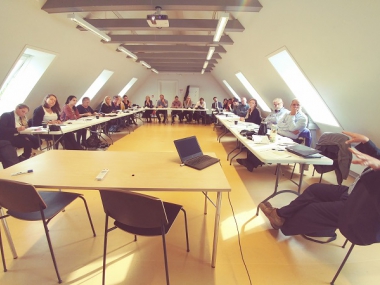URBinclusion First Transnational meeting in Copenhagen
Edited on
13 December 2017The URBinclusion Project held its First Transnational meeting for the project second phase in Copenhagen on the 26th and 27th of September 2017. All the sessions and visits took place in the Sydhavnen area Copenhagen South Port Area. Apart from the large delegation from the hosting city of Copenhagen, 18 representatives participated in the meeting from the following partner cities: Barcelona, Glasgow, Krakow, Lyon, Naples, Turin, Trikala. Only one partner city was unable to participate in the meeting.

The first day meeting was held at the Cultural Centre “Karens Minde Kulturhus”. Following the welcome speech by Mr. Bjarne Winge, CEO of the Copenhagen Municipality Employment and Integration Administration, there was a presentation by Professor John Andersen focusing on “How to understand and analyse social inclusion and empowerment”. Following this introductory part, under the guidance of project Lead Expert, Mr. Fernando Barreiro, all city representatives and officers worked in small groups on the “Operational Implementation Framework (OIF)” and started to draw their own Road Map and Time Line. Moreover, the project communication officer presented and discussed with participants the future foreseen internal and external communication activities.
 In the afternoon sessions, again under the guide of Mr. Barreiro, participants worked jointly to produce the Implementation Plan for the delivery of their local action plan, aiming to ensure coherence between strategies and actions.
In the afternoon sessions, again under the guide of Mr. Barreiro, participants worked jointly to produce the Implementation Plan for the delivery of their local action plan, aiming to ensure coherence between strategies and actions.
After these working sessions, all participants took part in an interesting guided tour of the South Harbour area to visit some underground cultural sites and the new urban developments supported and implemented by public-private partnerships.
On the second day, the meeting started at the AKB Common House from where participants started another inspiring guided tour of different sites in Sydhavnen: the Civic Centre Kvartershuset, Fælles Skaberne (The Communitaizers), the Civic Entrepreneurs Sydhavns Compagniet and the AKB (local Social Housing Association). During these visits, the participants had the chance to meet some stakeholders and managers of these initiatives. All participants were impressed by the level and the effectiveness of the activities and projects.
Civic Centre Kvartershuset: the neighbourhood house is an association funded by 12 AKB housing departments in Sydhavnen. The association is headed by a board consisting of residents from the membership groups. The aim is to create residential social activities that improve the quality of life and the local community feelings. The house is working actively to reduce loneliness among residents in Sydhavnen. This is done through different works and activities. Currently they have more than 900 participants in their senior activities and since 2016 they have created activities for parents and their children.
Fælles Skaberne (The Communitaizers) is the name of the social housing initiatiave for the Sjælør – Sydhavnen area in Copenhagen. It is part of the activities of AKB, København, which is a non-profit housing organization with more than 8,000 homes all over Copenhagen. AKB, København is owned by the tenants in the housing organization, which means that no one can profit from the rental. The rent is fixed so it covers the expenses of running the estates. Furthermore, non-profit estates are managed by an estate committee, which is elected by the tenants. The overall Fælles Skaberne plan focuses on the following four areas of action: Security and well-being; Education and employment; Prevention and parental responsibility; Crime Prevention. The Fælles Skaberne contribute, in close cooperation with the area's residents, to Sjælør & Sydhavn's development, as a living and safe area in Copenhagen. It is a 4-year social housing initiative that aims to strengthening the area's cohesion through involvement of citizens, municipalities, politicians and other stakeholders.
MedborgerCenter of the SydhavnsCompagniet. The Sydhavns Compagniet aims to ensure the effectiveness of social efforts supporting local employment and to promote networking and active citizenship among vulnerable citizens in the area. By motivating volunteering, they mobilize citizens' resources and thus support the framework for greater inclusion within the community. This resource mobilization is reflected in a social capital and integration that increases the security and development opportunities throughout the South Harbour. Overall, the organization's work can be seen as a value-based social (local) work focused on empowerment, active citizenship, networking and learning.
Opzoomerne in Danish, a local NGO inspired by the Dutch Opzoomer movement, that started in 1994 when the residents of Opzoomer Street got fed up waiting for local government to address problems of crime and blight. They came to realize that there was much that the neighbours themselves could do, and they decided to take action. In South Harbour, Opzoomerne is engaging primarily vulnerable citizens in gardening and running The Neighbourhut (Kvartershytten). Opzoomerne in Danish is an example of the outcome of URBACT, because it finds its origin in a former URBACT project in South Harbour, when, 15 years ago, they went to Holland and it was presented to Opzommers.
Under the guidance and support of project Lead Expert and the Project Coordinator, Mr. Txema Castiella, the host Business District Manager, Mr. Øystein Leonardsen led an interesting session discussing the lessons learned during the visits, and then closed the two-day meeting.
The project coordinator for Barcelona sincerely thanked the Copenhagen delegation for their hospitality and for organizing such an excellent meeting. All participants expressed their appreciation for the organization of the meeting and the chance to visit interesting and inspiring initiatives and sites.
The next project meeting will take place in Lyon on the 11th and 12th of January 2018. It will be a thematic seminar, which will focus on one of the project Implementation Challenges: Monitoring and evaluation of interventions to tackle poverty and social exclusion problems.
Submitted by Massimiliano Ru... on
